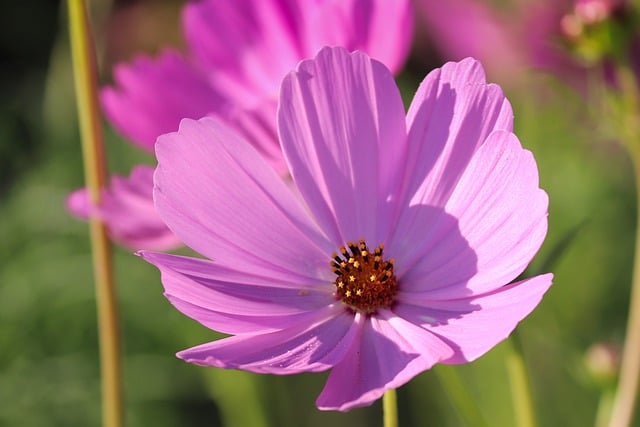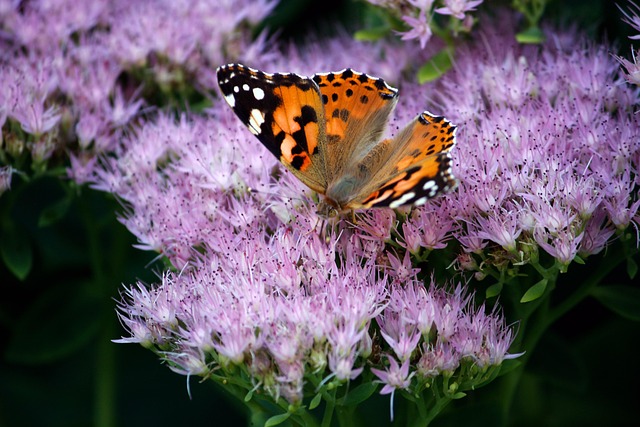Effective seasonal garden maintenance involves tailoring care to each season's unique needs. Spring focuses on awakening the garden with nitrogen-rich fertilizers and weeding, summer requires regular watering, pest management, and phosphorus fertilizing for flowering, autumn prepares for winter through harvesting, composting, and potassium-rich fertilizers, while winter involves protective measures like mulching. Fertilization strategies vary by season to support plant health and maximize harvests, with spring focusing on nitrogen, summer on phosphorus, and fall on potassium. Composting, done seasonally, enhances soil health and robust plant growth. Understanding these seasonal care needs ensures a thriving, productive garden year-round.
In the realm of gardening, seasonal variations play a pivotal role in shaping your green oasis. Understanding these changes and adapting your garden care accordingly is key to optimal growth. This article guides you through the art of seasonal garden maintenance, focusing on fertilizing and composting. From recognizing the impact of each season to adopting tailored fertilization strategies and mastering compost creation, discover practical tips to enhance your garden’s health and vibrancy throughout the year.
- Understanding Seasonal Changes and Their Impact on Your Garden
- Fertilization Strategies for Each Season
- The Art of Composting Throughout the Year
- Practical Tips for Efficient Garden Maintenance
Understanding Seasonal Changes and Their Impact on Your Garden

Understanding the ebb and flow of seasons is crucial for effective seasonal garden maintenance. Each season brings unique challenges and opportunities that can greatly affect plant health, growth patterns, and overall ecosystem balance. Spring, for instance, signals a time to awaken your garden from dormancy with nourishing fertilizers and careful weeding, as new plants emerge and the soil begins to warm up. Summer requires regular watering, pest management, and possibly additional fertilizing to support robust growth and vibrant blooms.
As autumn arrives, the focus shifts towards preparing for the cold winter months ahead. This involves harvesting crops, collecting and storing compost, and applying organic fertilizers rich in potassium to help plants endure the colder season. Winter maintenance may include protective measures like mulching to preserve soil temperature and moisture, along with regular monitoring for any signs of pests or diseases that could persist during this period. Seasonal garden maintenance, when tailored to these changes, ensures a thriving, resilient, and productive outdoor space throughout the year.
Fertilization Strategies for Each Season

In the realm of seasonal garden maintenance, fertilization plays a pivotal role in nurturing plants and ensuring a bountiful harvest. The strategies for fertilizing evolve with each season, aligning with the unique nutritional requirements of plants during their growth cycles. Spring, for instance, calls for a balanced approach to fuel new growth after winter’s dormancy. Organic fertilizers, rich in nitrogen, become instrumental in promoting lush foliage development. Summer requires a shift towards phosphorus-rich compounds to support robust flowering and fruit production. Fall fertilization focuses on building soil health for the upcoming rest period, with potassium-based fertilizers helping plants store energy for winter survival.
Understanding these seasonal variations allows gardeners to optimize their approach to fertilizing and composting. By tailoring nutrient application to each season’s needs, garden enthusiasts foster healthier plants, enhance crop yields, and contribute to a more sustainable gardening practice. This method of seasonal garden maintenance not only benefits the garden but also fosters a harmonious relationship with nature’s intricate cycles.
The Art of Composting Throughout the Year

Composting is an art that evolves with the seasons, aligning your gardening practices with nature’s rhythm. In spring, as new life bursts forth, compost enriches the soil to support robust plant growth. During summer’s warmth, maintain a steady compost supply to keep up with seasonal feeding demands. Autumn brings a wealth of organic material for composting, allowing you to prepare for winter. By following the ebb and flow of nature, your garden benefits from a rich, natural fertilizer that enhances soil health and promotes bountiful crops year-round. This holistic approach to seasonal garden maintenance ensures a dynamic and resilient ecosystem.
Practical Tips for Efficient Garden Maintenance

Maintaining a lush and vibrant garden throughout the seasons requires a strategic approach to fertilizing and composting. One of the most practical tips for efficient seasonal garden maintenance is to understand that different times of the year call for distinct care. In spring, when plants are awakening from their winter slumber, a balanced fertilizer can help promote healthy growth and blooming. Summer is all about sustaining that momentum with regular feeding, focusing on nitrogen-rich fertilizers to support lush foliage. As autumn arrives, switch to a phosphorus-rich formula to aid in flower and fruit development, and prepare the garden for the upcoming dormant period.
Additionally, composting plays a vital role in seasonal maintenance. Layering organic matter throughout the year ensures your soil stays nutrient-rich and well-aerated. In warmer months, compost heaps can heat up, accelerating the decomposition process; while in cooler seasons, maintain a consistent feeding schedule to keep the compost active. Regular turning of the pile also facilitates efficient nutrient distribution, ensuring your garden receives the best possible care for each season.
By adopting a seasonal approach to garden maintenance, including strategic fertilizing and composting, you can nurture a thriving outdoor space throughout the year. Understanding the unique needs of your garden at different times allows for effective care, ensuring optimal plant health and growth. With these practices, you’ll be well-equipped to maintain a vibrant and sustainable garden, making the most of each season’s opportunities. This holistic approach to seasonal garden maintenance is key to unlocking a lush, flourishing oasis in your own backyard.
